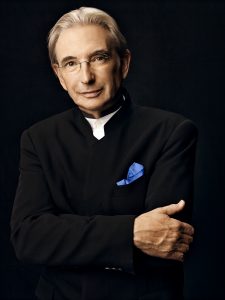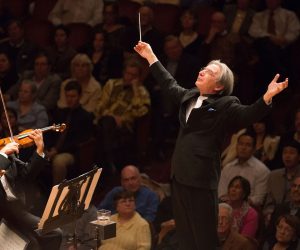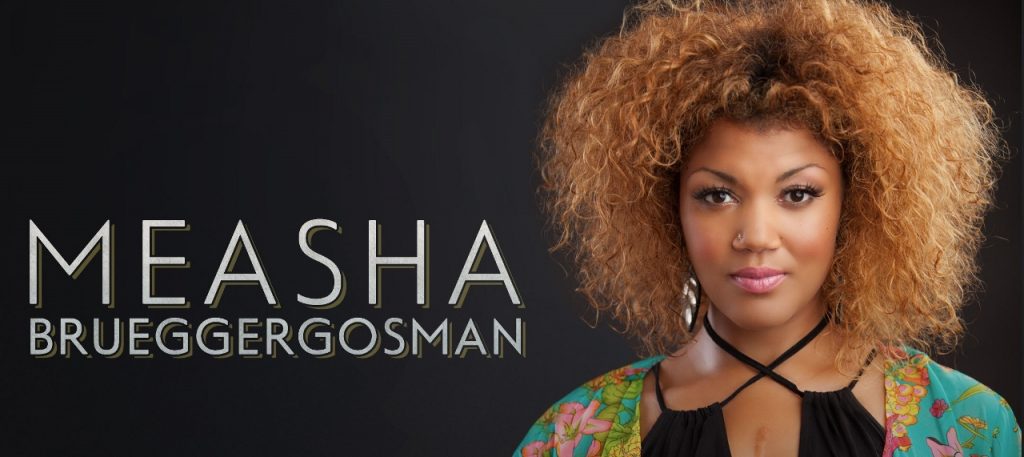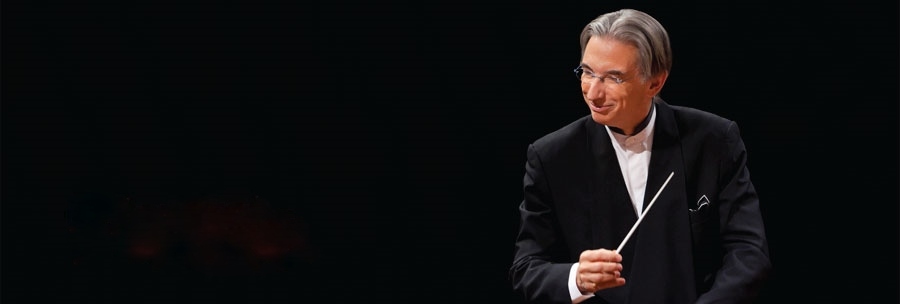NOTHING LIKE
MICHAEL TILSON THOMAS
EVER WAS
Michael Tilson Thomas is a rock star. The Los Angeles native, who made his conducting debut here 50 years ago, proved last night at Disney Hall that he not only maintains a Bernstein-like vigor at the podium — bringing pulse-pounding magic and emotion to Tchaikovsky’s Pathétique — he is also a thrilling composer.
It is no secret that Leonard Bernstein was a mentor and close friend of MTT, who turns 74 on December 21, but I’m rather certain San Francisco Symphony’s Music Director would have been just as colorful, flamboyant, dramatic, and charismatic in his conducting style even if he had never met Bernstein. The tall, thin, über-expressive descendant of the famous Thomashefsky Yiddish-theater dynasty has drama in his blood, and that expresses itself physically, whether he jumps, oscillates, or crouches. What I love most is that his style actually percolates into the music we hear. (I wish that our own conductor, Gustavo Dudamel, would bring more of that exciting exuberance to his work.)
His lengthy and delightful preamble to a near-full house last Saturday at the LA Phil premiere of his Four Preludes on Playthings of the Wind proved he is equally skilled as Bernstein as a speaker with a pedagogic flair. MTT is also a skilled pianist, and, as with George Gershwin, I hear that MTT will most likely improvising at the piano at  any given party. Indeed, he told us that the work came to him extemporaneously in 1976 during a fete in Venice Beach during the American Bicentennial — an apt time for contemplating Carl Sandberg’s four short poems from 1922, which are sung here word-for-word (MTT recited them to us first).
any given party. Indeed, he told us that the work came to him extemporaneously in 1976 during a fete in Venice Beach during the American Bicentennial — an apt time for contemplating Carl Sandberg’s four short poems from 1922, which are sung here word-for-word (MTT recited them to us first).
An observation about the fate of nations — and a warning about one possible fate for America, the poem’s “strong men” are depicted as building a great nation and then bragging that, “We are the greatest city, / the greatest nation: / nothing like us ever was.” As the poem describes it, these men revel in their reflected glory, putting those words on panels, and paying singers and chanters to repeat them. But in the course of time, the nation disappears and its central city falls into ruin, while everything it achieved is apparently forgotten. The effort by its builders to boast about their own greatness then takes on an ironic meaning because, as far as the world knows, nothing like them ever was.
If that sounds depressing, it’s not. That’s the genius of Sandberg: he my be wagging a finger of caution but it’s with a reflective nature. MTT went a step further because of our Bicentennial, and added a jazzy overlay to the ominous underpinnings. It’s almost as if he’s saying that all empires have fallen over time, so cheer up and enjoy what you’ve got. Finally completed two years ago, Four Preludes is now aided by ratchet, xylophone, wood, a cash register (a nod to Corporate America no doubt) and a synthesizer bubbling up like a cauldron working up to a boil. A supertitle, “The  past is a bucket of ashes,” says it all as out comes a chanteuse in dark swaddle and lights come up on a jazz nonet — including guitar, saxes, and drum set — seated on a platform behind the chamber orchestra.
past is a bucket of ashes,” says it all as out comes a chanteuse in dark swaddle and lights come up on a jazz nonet — including guitar, saxes, and drum set — seated on a platform behind the chamber orchestra.
But soon, the wrapping drops and soprano Measha Brueggergosman, for whom there aren’t enough superlatives, is backed up by Mikaela Bennett and Kara Dugan as they dance in sync like a ’70s’ girl-group (aided by the twangy Fender guitar sound of the era). These “golden girls” are dressed in form-fitting, glittering, spangled dresses singing “We are the greatest city” in an amalgamation of wildly inventive but immediately accessible music influenced by funk, Bernstein, Gershwin, Dutch composer Louis Andriessen, and so much more without ever sounding derivative. Instead of creating a half-hour work which easily could have been a downer, I was filled with hope. Rats and lizards and crows, oh my.
Tchaikovsky’s Sixth Symphony, however, was full of pathos-rich emotion and poignancy, especially given the exquisitely yearning of Principal Boris Allakhverdyan: when his clarinet died away, it made Tchaikovsky’s farewell so painfully stirring that I can count it as one of the most moving moments in my concert-going history. With elegance, intricacy and flashiness (and Joseph Pereira’s resounding timpani), a miracle occurred: I’ve never, ever seen patrons rise with applause after the third movement!
Once they settled back in for the fourth, Tilson Thomas, playing from memory, showed why it doesn’t matter what is behind one of Tchaikovsky’s best works (“Let them guess,” Tchaikovsky wrote to his nephew, to whom he dedicated the programmatic work). He ensured that the sixth is absolute proof of Tchaikovsky’s supremacy as a composer (he rightfully described it as “the best thing I ever composed or shall compose”), a work that proved he was more than a populist ballet maker. Moreover, MTT left us with an image of corporeal collapse as the way of the world — whether that means the death of our bodies (Tchaikovsky died mysteriously nine days after premiering the work) or an empire (America..? Well…).
What is certain is that nothing like Michael Tilson Thomas or Tchaikovsky ever was.
Coming up this weekend, Fri. thru Sun., Dec. 7-9, 2018, MTT returns with the LA Phil with two Tchaikovsky masterpieces: The Romeo and Juliet Overture-Fantasy and Variations on a Rococo Theme (with French cellist Gautier Capuçon); and a favorite of mine that rarely gets played: Charles Ives’ A New England Holiday Symphony, which swerves between affectionate romanticism and ferocious anarchy, a aural three-ring circus. Attractive and challenging, the work, as with most of Ives’ music, emboldens us to contemplate sound in new ways.
photos courtesy of LA Phil
MTT photo by Art Streiber
Los Angeles Philharmonic
Michael Tilson Thomas, guest conductor
Measha Brueggergosman, soprano
Walt Disney Concert Hall, 111 S. Grand Ave.
played Nov. 30, Dec 1 & 2, 2018
for future events, call 323.850.2000 or visit LA Phil



